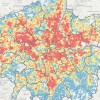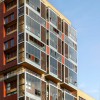News and Events Categories: Local Authorities
LCCP Update 7 March 2022
March 7, 2022
IPCC Report: Impacts, Adaptation and Vulnerability You’ll have seen by now that the IPCC’s Sixth Assessment (AR6) Working Group II published its findings last Monday in a report called “an atlas of human suffering” by UN Secretary-General Antonio Guterres. There has been plenty of good commentary on this 3000+ page report, but we’ll add a … Read more
LCCP Update 7 February 2022
February 7, 2022
Measuring and Reporting of Climate-related Physical Risks Mandatory disclosure of climate-related risks is due to come into force from April 2022 for large organisations and financial institutions, likely expanding to smaller organisations by 2025. In order to support organisations in measuring and reporting climate-related physical risks, UKGBC is launching a new TCFD-aligned report which provides guidance on … Read more
LCCP Update 14 January 2022
January 14, 2022
London’s climate risk mapping training session recording Last month we held a workshop training session with Bloomberg Associates for stakeholders from across London and beyond. It covered the background and purpose of the mapping project, the features of the mapping, and how decision-makers are using the mapping in their sectors to help consider at-risk … Read more
London’s climate risk mapping – training session
January 12, 2022

On December 8 2021, the GLA and Bloomberg Associates held a training session for stakeholders across London and beyond. This covered the background of the project, the features of the maps, and how decision-makers across different sectors are using the maps to help consider at-risk populations in their work. Find the maps here. Find a … Read more
LCCP Update 17 December 2021
December 17, 2021
Building Regs changes to support net zero, prevent overheating Under new regulations introduced on 15 December, CO2 emissions from newly built homes must be around 30 percent lower than under current standards. Emissions from other new buildings, including offices and shops, must be 27 percent lower. In addition, all new residential buildings—including homes, care homes, … Read more
LCCP Update 29 November 2021
November 29, 2021
Greening for cooling and clean air The Global Centre for Clean Air Research at Surrey University and University of Wollongong in Australia present this Healthy Green Streets webinar on 1 December, the final webinar in a series looking at street-scale greening for cooling and clean air in cities (the SCAN project). The webinar will feature … Read more
LCCP Update 5 November 2021
November 5, 2021
Need help following COP26? All the news and commentary around the negotiations and other events can be bewildering. Luckily, the Local Governments and Municipal Authorities constituency of the UNFCCC (LGMA) has compiled a list of four publications providing background that can help you get to grips with what’s going on. The NDC Synthesis Report gives … Read more
Urban Climate Walk
July 29, 2021

As part of an ongoing research project concerned with built form, microclimates, and critical urban infrastructure, Julie Futcher runs an urban climate walk through the City of London. The walk presents a unique view of the city through the role of its buildings in creating distinct microclimates and offers a novel perspective on the city’s … Find out more
Climate-resilient schools
June 22, 2021

The effects of overheating, flooding, and poor air quality are already being felt in our buildings, including our schools. Some 49 percent of London’s schools are at high or medium risk from surface water flooding. High temperatures already affect the wellbeing and concentration levels of schoolchildren. Climate change will increase the frequency and severity of … Read more
Urban climate resilience: tackling microclimates and dwelling overheating
June 7, 2021

A joint LCCP/Buildings and Cities event The design of our cities, streets, open spaces and homes impacts on the local climate (microclimate) as well as on the health of citizens. Compact urban form is often argued to be a more sustainable approach, but can cause adverse consequences on local microclimates, with localised cascading impacts on … Read more